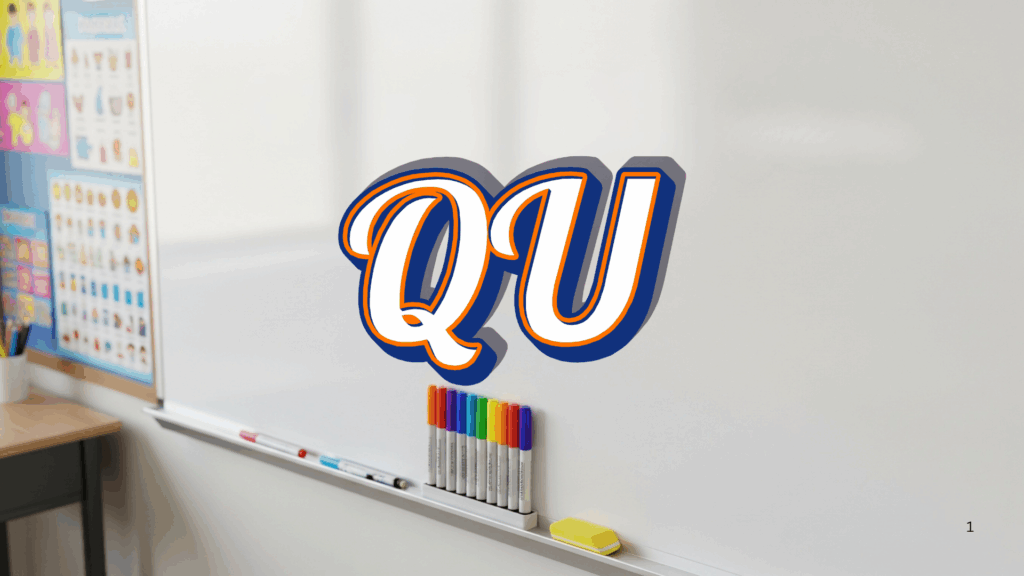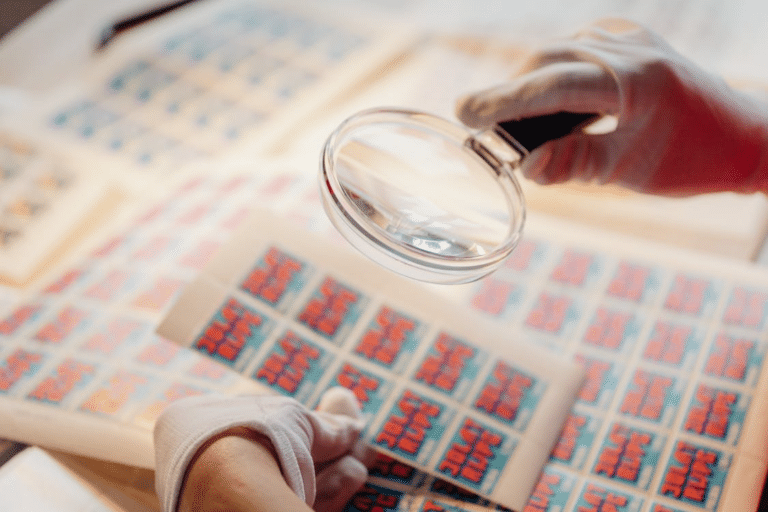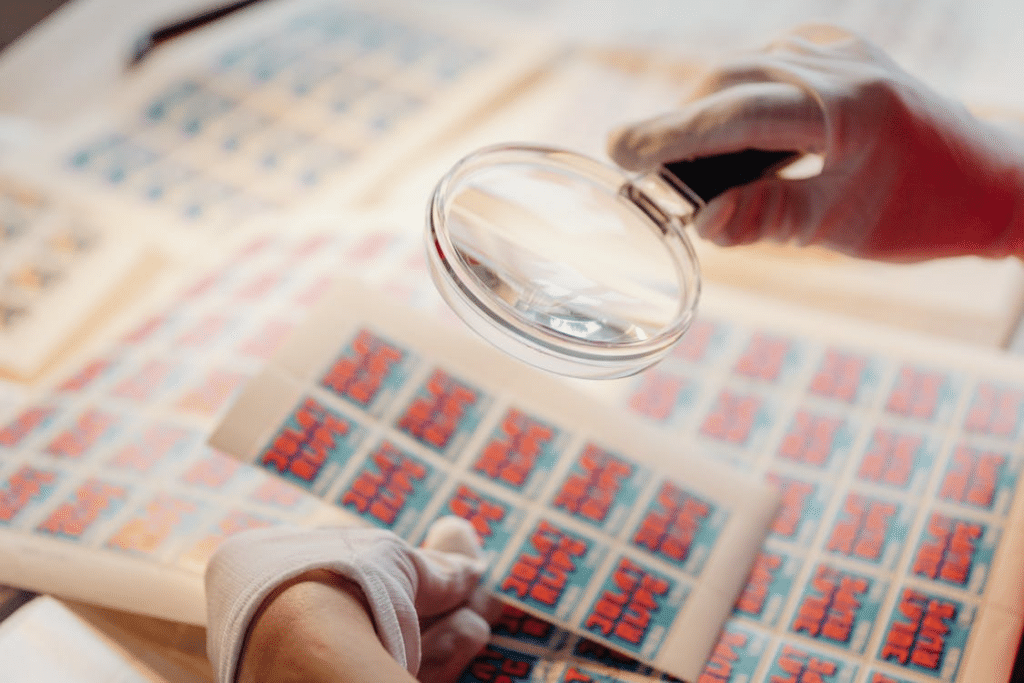Learning to read can be challenging, especially with letter combinations that don’t sound the way they look.
One essential pair to master early on is the “qu” digraph. This letter team makes the /kw/ sound and appears in many everyday words, such as “queen,” “quick,” “square,” and “question.”
Helping kids recognize and pronounce “qu” words correctly builds strong phonics skills and boosts reading confidence.
No matter if you’re a teacher guiding a class, a parent helping at home, or a young reader yourself, about words with qu in them is a key step toward literacy success.
This blog is packed with valid “qu” words, practice tips, and examples to make learning this digraph simple, fun, and effective.
What is the QU Digraph?
A digraph is when two letters come together to make one sound. In the case of “qu,” the letters “q” and “u” team up to create the /kw/ sound, like in “queen” or “quick.”
Unlike blends, where both letter sounds are heard, a digraph creates a single new sound. The “qu” digraph is special because the letter Q rarely appears alone in English.
Teaching kids that “qu” says /kw/ helps them sound out and read many common words.
This concept is key in early phonics and lays the groundwork for understanding more advanced vocabulary later on.
QU Words Segregated by Position
The qu digraph appears in three main positions within words, and recognizing these patterns helps readers become more fluent and confident.
Understanding word positioning makes it easier to decode unfamiliar words and improves overall reading skills.
QU Words at the Beginning
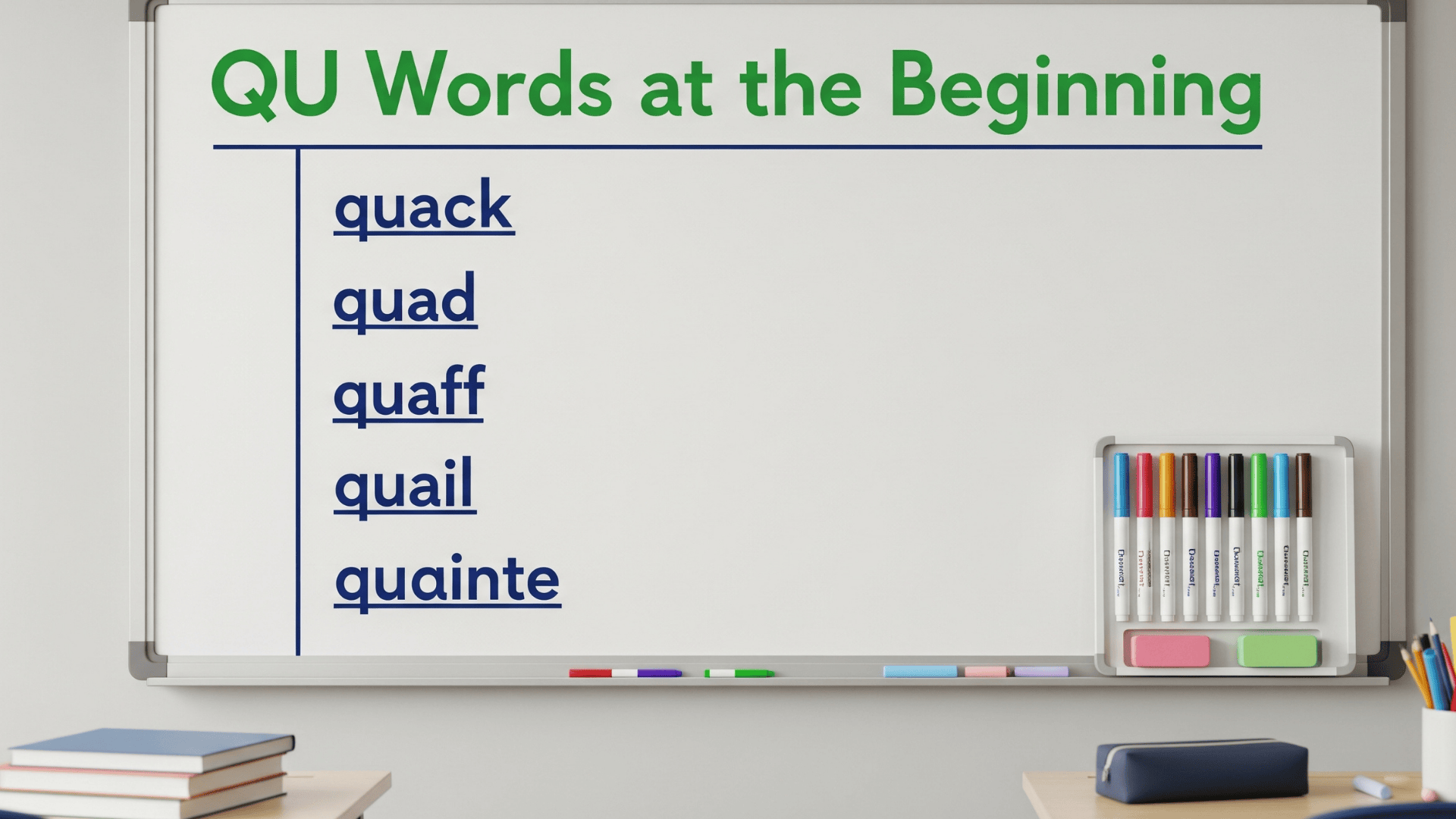
Words that start with the qu sound are often the easiest for children to recognize and pronounce. These initial words with qu in them help students connect the written digraph with the spoken sound clearly.
-
quack
-
quad
-
quaff
-
quail
-
quaint
-
quake
-
qualification
-
qualified
-
qualifier
-
qualify
-
quality
-
qualm
-
quandary
-
quantifiable
-
quantification
-
quantify
-
quantity
-
quantum
-
quarantine
-
quark
-
quarry
-
quart
-
quarter
-
quarterback
-
quarterdeck
-
quarterfinal
-
quarterly
-
quartet
-
quartz
-
quash
-
quasi
-
quaternary
-
quaver
-
quay
-
queasy
-
queen
-
queendom
-
queenly
-
queer
-
quell
-
quench
-
querulous
-
query
-
quest
-
question
-
questionable
-
questioner
-
questionnaire
-
queue
-
quibble
-
quiche
-
quick
-
quicken
-
quicker
-
quickest
-
quickly
-
quicksand
-
quid
-
quiet
-
quieter
-
quietest
-
quietly
-
quietude
-
quiff
-
quill
-
quilter
-
quilting
-
quilt
-
quintet
-
quintuple
-
quip
-
quipped
-
quipping
-
quirk
-
quirky
-
quirt
-
quit
-
quite
-
quitter
-
quitting
-
quiver
-
quixotic
-
quiz
-
quizzical
-
quizzed
-
quizzes
-
quizzing
-
quotha
-
quoad
-
quokka
-
quoll
-
quo
-
quorate
-
quorum
-
quota
-
quotable
-
quotation
-
quote
-
quoter
-
quoting
-
quotidian
-
quintic
-
quintillion
-
quinquagenarian
-
quinquennial
-
quasar
-
qubit
-
quackery
-
quadrangle
-
quadrant
-
quadrate
-
quadratic
-
quadriceps
-
quadrilateral
-
quadrille
-
quadriplegia
-
quadruped
-
quadruple
-
quadruplet
-
quadruplication
-
quahog
-
quaintly
-
quaternion
-
quantal
-
quantize
-
quantized
-
quantizing
-
quantumly
-
quarreled
-
quarreling
-
quarrelsome
-
quarrel
-
quarried
-
quarrying
-
quarreler
QU Words in the Middle
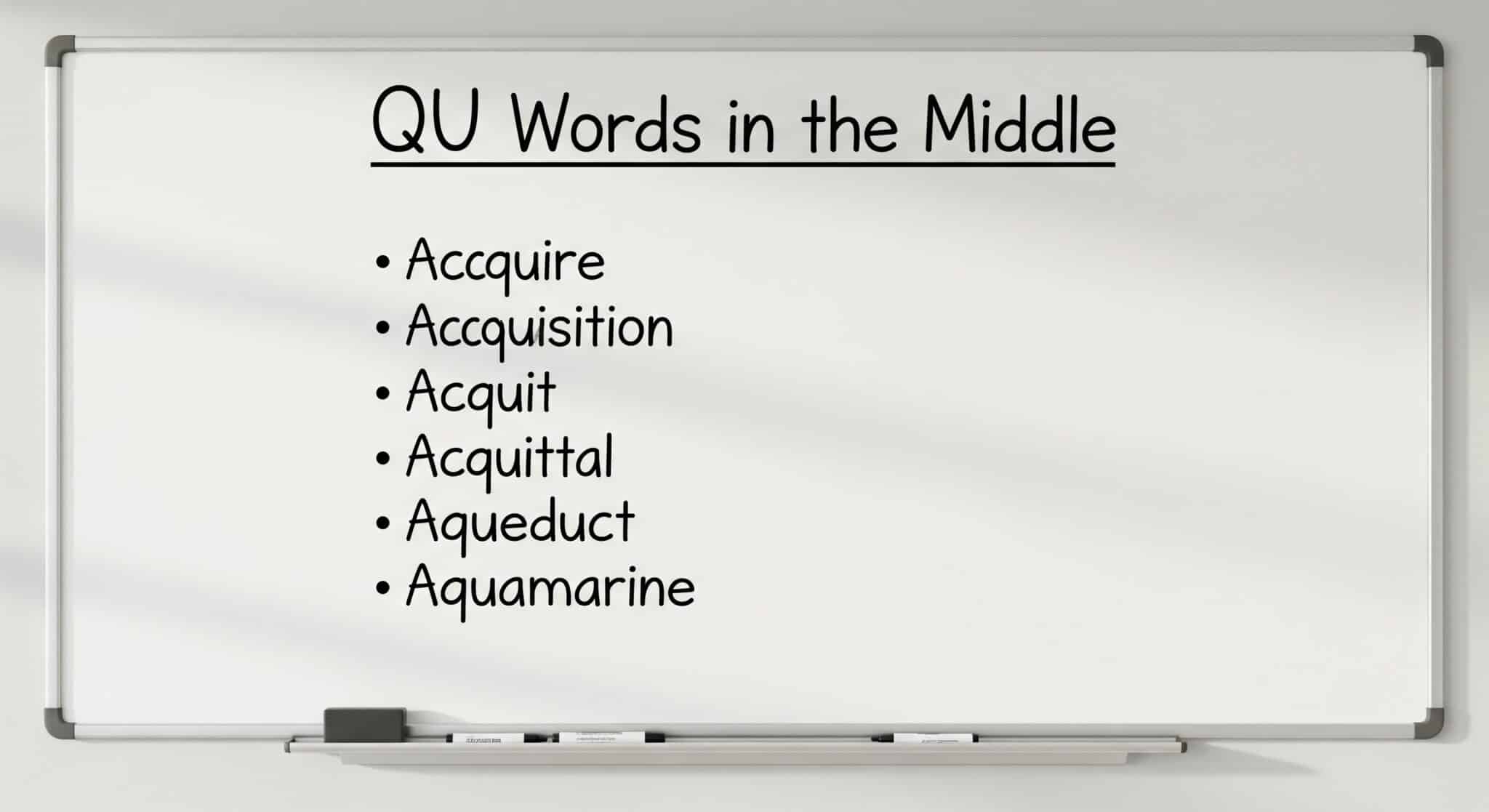
Words with qu in the middle position can be trickier to spot, but are equally important for reading development. These medial words with qu in them help students recognize the digraph when it’s embedded within longer words.
-
acquiesce
-
acquire
-
acquisition
-
acquit
-
acquittal
-
aqueduct
-
aquamarine
-
aquarium
-
aquifer
-
aquatic
-
antiquate
-
antiquated
-
antiquity
-
baroque
-
conquer
-
boutique
-
torque
-
burlesque
-
cheque
-
grotesque
-
marquise
-
bisque
-
mosque
-
mystique
-
antique
-
unique
-
risqué
-
physique
-
arabesque
-
technique
-
plaque
-
marquee
-
masquerade
-
equator
-
equation
-
equine
-
equity
-
equable
-
equably
-
adequate
-
inadequacy
-
unequal
-
disqualify
-
prerequisite
-
tranquil
-
tranquility
-
loquacious
-
eloquent
-
colloquial
QU Words at the End
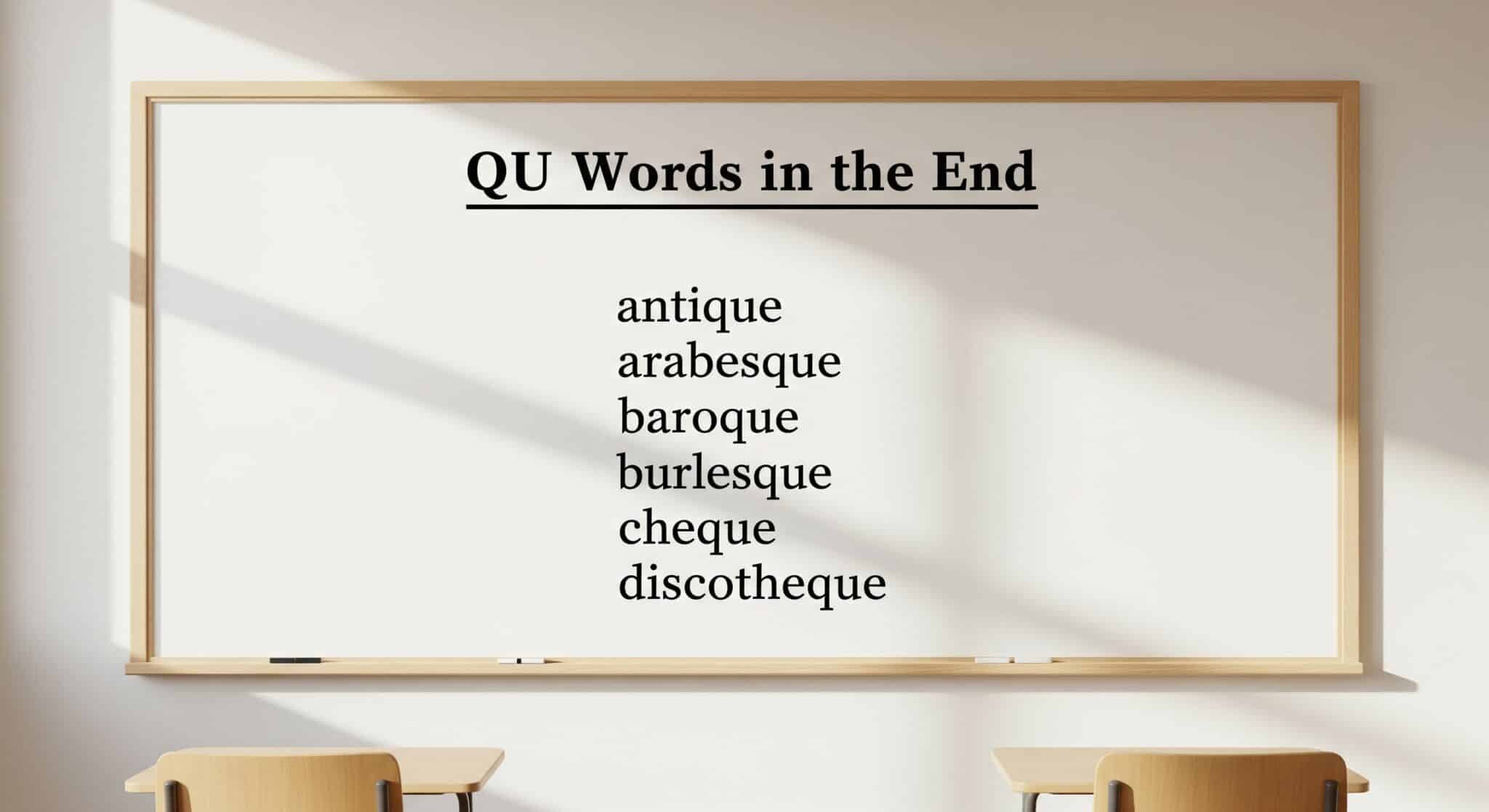
Words with qu in them are less common in English but appear frequently in borrowed words from French. These final qu words complete the pattern recognition needed for full qu digraph mastery.
-
antique
-
arabesque
-
baroque
-
burlesque
-
cheque
-
discotheque
-
grotesque
-
mosque
-
oblique
-
opaque
-
plaque
-
picturesque
-
prologue
-
silhouette
-
unique
-
boutique
-
barbeque
-
torque
-
technique
Multi-Syllable QU Words
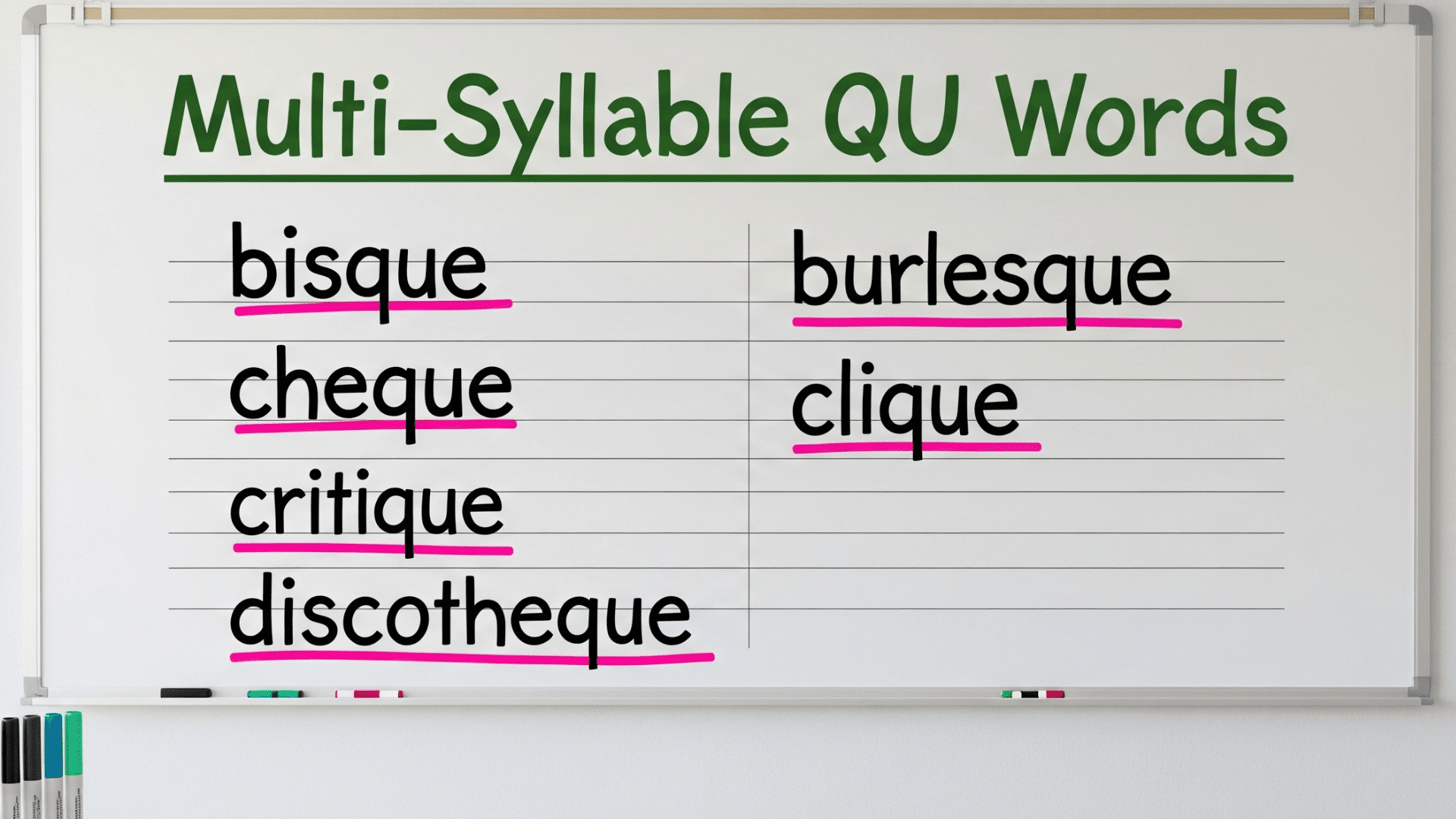
Multi-syllable words with qu in them digraphs help students tackle more complex vocabulary and improve their reading fluency.
-
equable
-
equably
-
equal
-
equality
-
equalization
-
equalize
-
equalized
-
equalizer
-
equanimity
-
equate
-
equation
-
equator
-
equatorial
-
equerry
-
equestrian
-
equiangular
-
equidistant
-
equilateral
-
equinoctial
-
equinox
-
equip
-
equipment
-
equipped
-
equipping
-
equitable
-
equitably
-
equitation
-
equivocal
-
equivocate
-
equivocally
-
equivocation
-
equivocating
-
unequal
-
unequally
-
inequality
-
inequitable
-
inequitably
-
inadequate
-
adequate
-
adequately
-
inadequately
-
prerequisite
-
requisition
-
soliloquy
-
colloquialism
-
inquisition
-
disquisition
-
acquisitive
-
acquired
-
acquiring
-
liquid
-
liquefy
-
liquefaction
-
liquidate
-
liquidated
-
liquidation
-
liquidator
-
liquidity
-
liquor
-
liqueur
-
obliquely
-
obliqueness
-
statuesque
-
quintessence
-
quintessential
-
quintuplet
-
ventriloquist
-
inquisitive
-
eloquently
-
eloquence
-
frequency
-
frequent
-
frequently
-
infrequent
-
infrequently
-
sequel
-
sequence
-
sequential
-
sequentially
-
consequent
-
consequently
-
consequence
-
consequential
-
subsequent
-
subsequently
-
subsequence
-
equivalent
-
equivalence
-
adequacy
-
quant
-
quantified
-
quantifying
-
quantifiable
-
quantification
-
quantity
-
quantities
-
quietness
-
quizzer
-
quizmasters
-
quizzers
-
quintet
-
quintic
-
quintillion
-
quadrupedal
-
quadruplication
-
quadrupled
-
quandary
-
quantile
-
quartile
-
quenched
-
quencher
-
quenches
-
quenching
-
querist
-
questioner
-
questionnaire
-
questioning
-
queued
Sentences for Reading Practice
Each sentence contains multiple words with qu in them for concentrated practice.
- The queen quickly quilted a square quilt while sitting quietly in her quarters.
- Equal quantities of liquid were required to rescue the earthquake victims adequately.
- The quarterback’s unique technique helped his squad squeeze through the quarter-finals.
- Frequent questions about the antique vase intrigued the boutique owner’s curiosity.
- The squirrel squirmed and squeaked when the quiet child tried to rescue it.
- Adequate equipment was required to conquer the challenging quest for buried treasure.
- The eloquent speaker’s subsequent speech about equality left the audience quite moved.
- Quick quiz questions helped students acquire knowledge about ancient conquest stories.
- The unique boutique displayed exquisite antiques and handcrafted quilts for sale.
- Frequent earthquakes in the quarry required workers to question their safety procedures.
These sentences demonstrate how qu words work naturally in context, helping students understand meaning while practicing pronunciation.
YouTube Picks for Qu Sound Learning Fun
Visual and auditory learners thrive with video content. These engaging clips reinforce “qu” pronunciation and spelling through repetition and fun contexts.
-By Little Learners
-By Miss Phonics
Teaching Tips and Strategies
Teaching qu words is easier when you keep it simple, fun, and hands-on. These tips help kids remember and apply the /kw/ sound in everyday reading.
- Teach Q and U as “best friends” that stick together
- Start with simple qu words like quiz and quit
- Use picture cards and anchor charts for visual support
- Add fun games like “Queen’s Quest” to boost interest
- Practice writing qu words in sand, air, or with magnets
- Read books with qu words to hear them in real sentences
These activities make learning the qu digraph fun and memorable for young readers.
Bottom Line
Mastering qu digraph words lays the groundwork for reading success and lifelong learning. These letter pairs show up in books, schoolwork, and everyday speech.
Once students grasp how the “qu” sound is used at the beginning, middle, or end of words, they gain access to hundreds of applicable vocabulary terms.
No matter if you’re guiding a class or supporting a child at home, every little improvement counts. Celebrate each new word mastered.
Over time, the qu sound will become automatic, helping young readers build fluency and confidence.

